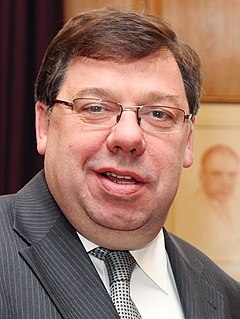A Quote by John C. Bogle
While the apostles of the new so-called "behavioral" theory present ample evidence of how often human beings make irrational financial decisions, it remains to be seen whether these decisions lead to predictable errors that create systematic mispricings upon which rational investors can readily and economically capitalize.
Related Quotes
Strategic planning is the continuous process of making present entrepreneurial (risk-taking) decisions systematically and with the greatest knowledge of their futurity; organizing systematically the efforts needed to carry out these decisions; and measuring the results of these decisions against the expectations through organized, systematic feedback.
People are trying to build a society where they can talk across the aisle so to speak, and have civil discourse. At the same time we're trying to inform ourselves about what's really true so that we can make evidence based decisions that is better than superstition or rumor. But the fact is that people who use evidence based decision making have much better life outcomes, greater life satisfaction, they live longer, they make better personal and medical decisions, better financial decisions. But parallel to that is you can't reason somebody out of a position they didn't reason themselves into.
If we all make systematic mistakes in our decisions, then why not develop new strategies, tools, and methods to help us make better decisions and improve our overall well-being? That's exactly the meaning of free lunches- the idea that there are tools, methods, and policies that can help all of us make better decisions and as a consequence achieve what we desire-pg. 241
We've seen in terms of the reaction to some proposals in the Budget already how resistant that public opinion is to, first of all, a public comprehension of the new paradigm in which we have to operate; and secondly, to the rationale for the decisions that we're taking and the reason for those decisions to be implemented and followed through.
There is no limit to suffering human beings have been willing to inflict on others, no matter how innocent, no matter how young, and no matter how old. This fact must lead all reasonable human beings, that is, all human beings who take evidence seriously, to draw only one possible conclusion: Human nature is not basically good.
I'm interested in the balance between big currents in history - the economies, the ideologies, social structures, and so on - and the decisions that people have to make. At the heart of all these great decisions to go to war, there are human beings who have to say, 'Yes, let's do it,' or 'No, we won't do it.'
Prudence does not mean failing to accept responsibilities and postponing decisions; it means being committed to making joint decisions after pondering responsibly the road to be taken, decisions aimed at strengthening that covenant between human beings and the environment, which should mirror the creative love of God, from whom we came and towards whom we are journeying.
I don't think we are all irrational every time we fail to see through an argument in a book, but suppose it's true about you. You are still more rational than you think you are. You are irrational in a minor way - believing a misguided theory of the nature of rationality - but rational in a major way - you respond well to probabilistic evidence as you go through the day.

































